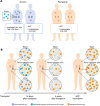HOPE springs eternal: lack of HIV superinfection in HIV Organ Policy Equity Act kidney transplants
- PMID: 39403922
- PMCID: PMC11473159
- DOI: 10.1172/JCI184326
HOPE springs eternal: lack of HIV superinfection in HIV Organ Policy Equity Act kidney transplants
Abstract
Kidney transplantation from donors with HIV to recipients with HIV (HIV D+/R+) is an emerging practice that has shown substantial clinical benefit. Sustained HIV superinfection, whereby a transplant recipient acquires a new strain of HIV from their organ donor, is a theoretical risk, which might increase chances of viral failure. In this issue of the JCI, Travieso, Stadtler, and colleagues present phylogenetic analysis of HIV from kidney tissue, urine, plasma, and cells from 12 HIV D+/R+ kidney transplants out to five years of follow-up. Early after transplant, donor HIV was transiently detected in five of 12 recipients, primarily from donors with untreated HIV and high-level viremia, consistent with a viral inoculum. Long-term, donor HIV was not detected in any recipients, demonstrating no sustained HIV superinfection. These reassuring data support earlier findings from South Africa and the United States and further confirm the safety of HIV D+/R+ transplantation.
Conflict of interest statement
Figures

Comment on
- Longitudinal analysis of viral dynamics in HIV+-to-HIV+ HOPE Act kidney-transplant recipients doi: 10.1172/JCI181560
References
MeSH terms
LinkOut - more resources
Full Text Sources
Medical

